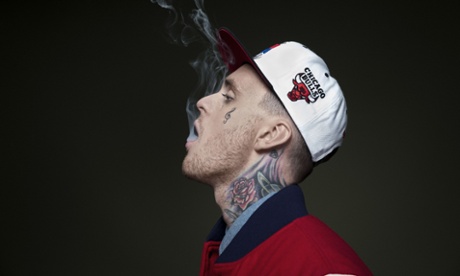
Last year Matt Colwell, better known by his artist moniker 360, spent an entire month holed up in his manager’s house. In that month, Australia’s most popular rapper neither wrote nor recorded any new music. Instead he spent the month trying to get clean of the drugs that had taken over his life.
The meteoric success of the 27-year-old came after the 2011 release of his second album Falling & Flying. It would be inaccurate to say he was unprepared for success. He had, after all, persuaded his parents to fund a rent-free few years in Melbourne, with the promise that he’d one day be the biggest rapper in the country. But not even blind ambition could have prepared him for exactly what happened next.
Falling & Flying was certified a platinum seller, and one of its singles, Boys Like You, went four times platinum. Colwell was instantly catapulted into the fame game. The kind of fame that saw a record store signing in Melbourne, in October 2011, get so out of control riot police had to be called in.
Colwell didn’t handle the newfound celebrity status well, and imploded. He was drinking heavily and taking copious amounts of drugs (exactly what kind of drugs, he won’t divulge).
It was during this period his manager, Rae Harvey, stepped in. “I reached a point where, if I didn’t stop, I would die,” says Colwell. “[Rae is] like my mother, man. She’s proved to me that our relationship isn’t just a business relationship. I didn’t go to rehab like everyone said. She looked after me.”
Getting clean took time. He claims not to remember the exact time of year his stay at Harvey’s house took place, only that it was an extremely difficult experience. By the time he stepped onstage this January to support Eminem on his Australian tour, the rapper could claim he was completely clean. And with the release of his third album Utopia, he’s climbing another rung in his already eventful professional career.
Utopia is an unconventional record because Colwell pulls off an almost impossible trick. There are huge, gushing amounts of sugary pop production, but the lasting impression on listeners are of Colwell’s honest and unflinching lyrics, rather than how danceable the music is. On tracks like By All Means, the artist is clearly firing on all cylinders:
Sorry for rambling /
It helps me out the bottomless pit that I crash-landed in.
“One of the biggest criticisms since my last album is that I’m a pop singer and I can’t rap,” he says. “That really resonated with me. My whole aim with this album is to show that I can still make pop songs that get played on the radio, but I can also rap my arse off. I come from underground hip-hop and I know how it works.”
Such critics have accused Colwell’s major label, EMI, of turning him into a product; a pop phenomenon designed to compete with the Pitbulls and Iggy Azaleas of the charts. But the rapper maintains he has full creative control. “The label doesn’t have a say. They can give their opinions, but they have no creative control.”
It’s difficult to give credibility to that statement when listening to the album’s second single Price Of Fame, which could have been plucked from Eminem’s back catalogue. On the other hand, what commercial label would have elected Lunar C, a foul-mouthed UK battle rapper known for destructive punchlines, for collaboration? On album track Sixavelli, he and Colwell go back and forth, dropping blistering rhymes.
“They wouldn’t let me hook up with Lunar C if they were trying to control shit,” Colwell says of his label. “They want single after single, not that real dark-horse shit.”
There’s a nickname for Aussie rap: “skip-hop”, with “skip” – as in Skippy the Kangaroo – a derisive term for Caucasian Australians. And for a long time, stores like JB Hi Fi would file music under the word. But these days skip-hop has become shortcut for a hip-hop scene dominated by white males “rapping about partying and beer” and under-represented by women and ethnic minorities. Colwell, lest we forget, is white, male, the biggest rapper in Australia, and (sobriety aside) has nothing against partying and beer.
“Yeah, I’ve heard of that shit,” he says, when the term was put to him. “That’s one of the most annoying, piece-of-shit ways to describe what Aussie hip-hop is.”
“Anywhere you go, there are going to be rappers who are sexist,” says Colwell. “But the most successful artists here aren’t like that. Bliss N Eso, Seth Sentry, they aren’t misogynistic whatsoever. They’re really good people.
“American hip-hop is way more misogynistic. They’re talking about girls shaking their arses and getting their tits out. That doesn’t happen in Aussie hip-hop.”
- 360 is touring nationally throughout September.

